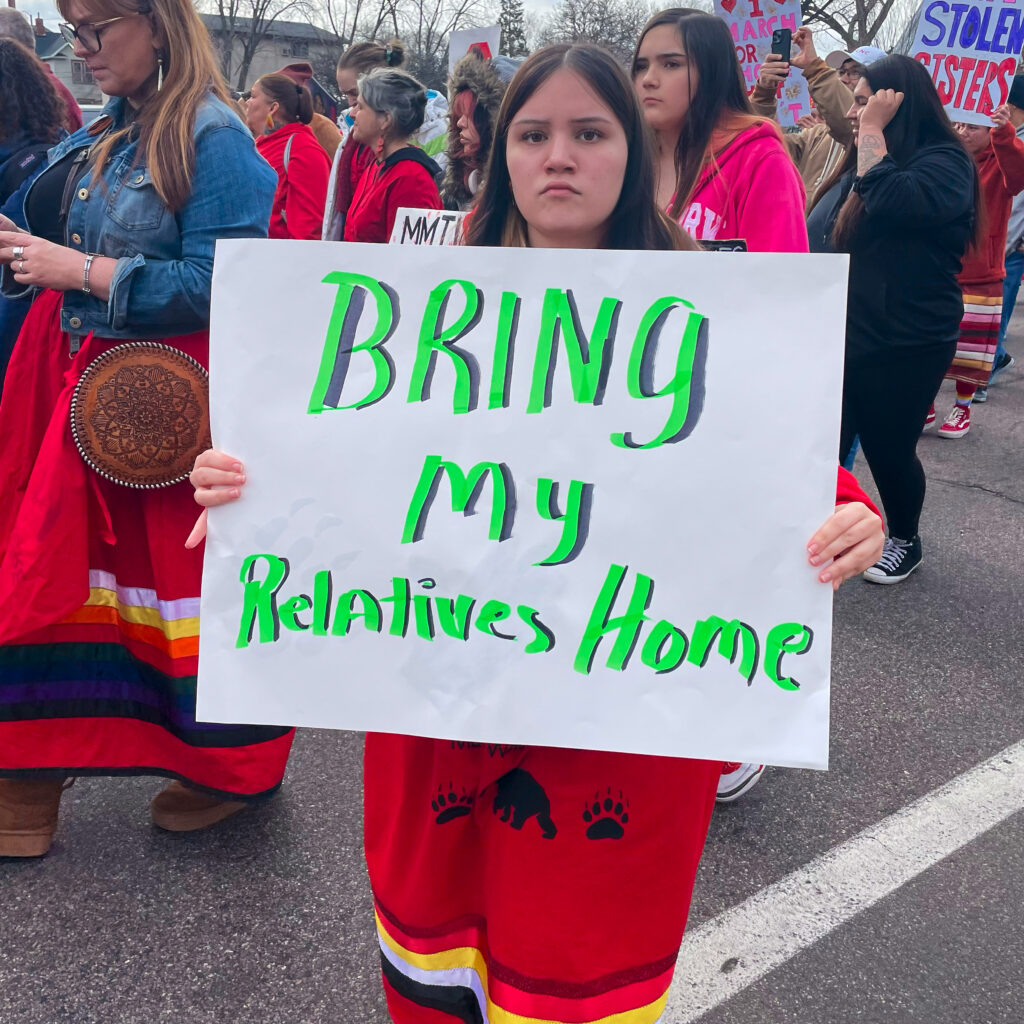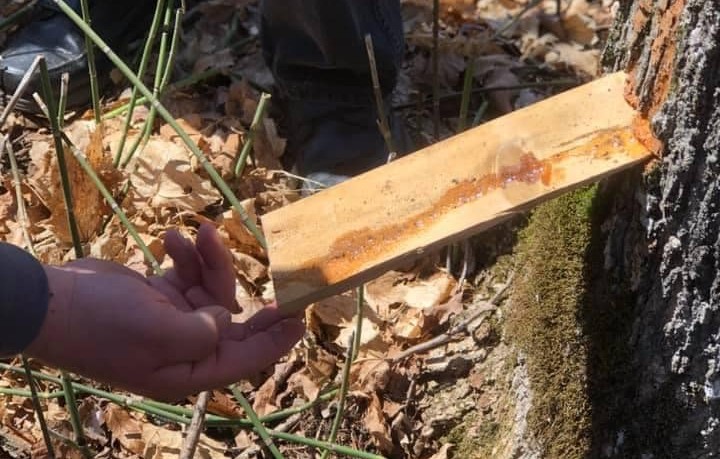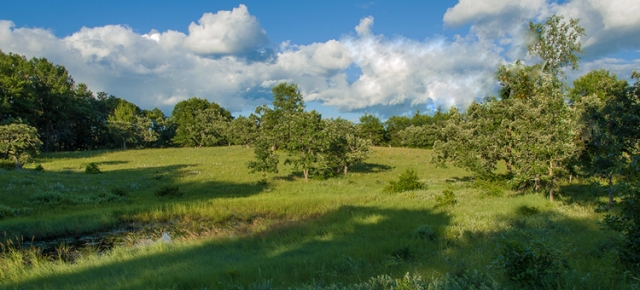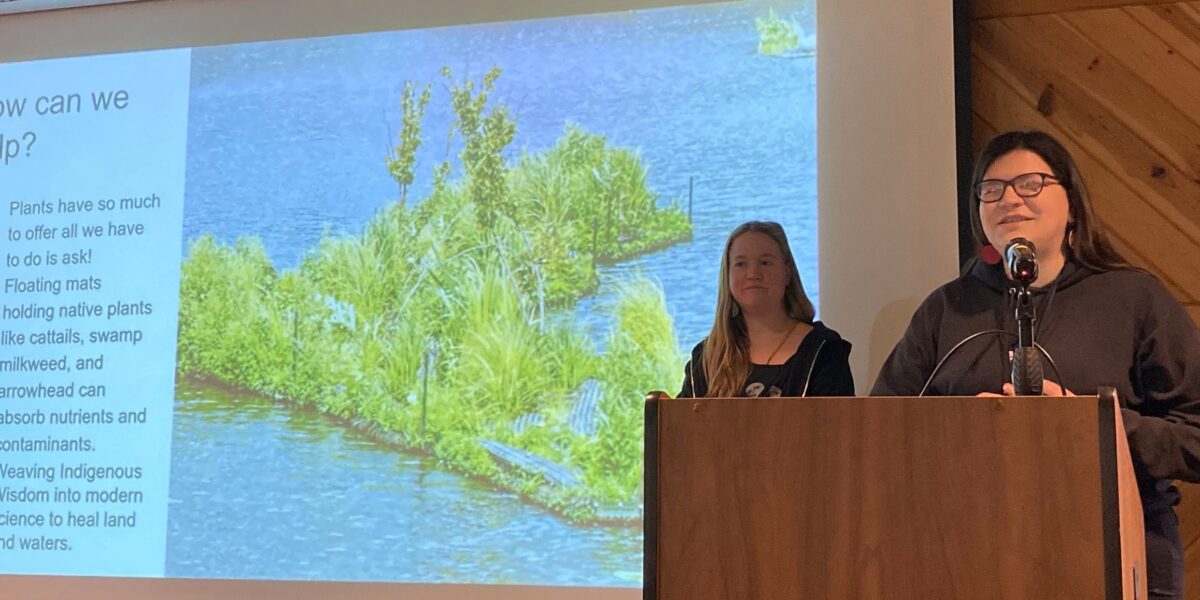
Photo Credit Emma Needham
For nearly a decade, the Minneapolis Native community has gathered in the East Phillips neighborhood to keep the missing or murdered Indigenous relatives in the collective consciousness. All too often, Native people are simply not given the same attention as their white counterparts. This Day of Action is a wake-up call to for the public to learn how drastic of an issue this is for the Native community. The demonstration gathers powerful speakers, community healing practices, and offers community-based information that may provide resources to families who have experienced the loss of a cherished loved one
February 14th is the National Day of Action for Missing and Murdered Indigenous Relatives. Every year, in Minneapolis, the Native community gathers to remember relatives who are still missing, or those who lost their lives to violence. Reporter Deanna StandingCloud has the story.
Deanna StandingCloud: Hundreds of community members came together in Minneapolis on February 14th, 2024, for the annual Missing & Murdered Indigenous Women & Relatives Day of Action & March. Wearing red as a declaration of solidarity, the visual landscape in the East Phillips Community Center was striking. Spirited messages calling for remembrance of relatives & the display of the iconic red handprint demands awareness of the epidemic of missing or murdered relatives prevalent across Indian Country. Attendees also had the opportunity to hear powerful testimony directly from the families of missing or murdered loved ones. Kathleen Mishow, mother of Kateri Mishow, takes the stage.
Kathleen Mishow: Our daughter Kateri has been missing for over 17 years. Her Indian name is “Waabigwanens” Little Flower. I pray each & every day that we would get some answers. Somebody knows what happened to Kateri. We need to bring her home.
DS: Neveah Kingbird from Bemidji has been missing since October 2021. Her mother, Terri Wind, says Neveah is an artist, a storyteller, and is proud of her heritage. She shares an essay Neveah wrote when she was in sixth grade.
Teddi Wind: Our language informs us about who we are as Anishinaabe. It tells us how to do things. It is used in our ceremonies our traditional teachings. And for some of us, in our homes. We must encourage each other to learn our language and to speak, in our schools, in our homes, in our everyday conversations. If we speak to each other in Ojibwe language, you will never have to question who we are. To speak our language is to be Anishinaabe by “Giizhigaanigookwe” Nevaeh Kingbird.
DS: This is the 9th year Minneapolis has had a Missing & Murdered Indigenous Women & Relatives Day of Action & March. Similar events were held throughout the state as well, including in Bemidji & Duluth. These gatherings bring about a sense of community & healing but also sheds light on these cases, which are largely never covered by national or local media.
Speaker: We will continue doing these marches, these rallies will continue fighting for your relatives, for our relatives, for our community, because we all deserve justice.
DS: According to data from the Minnesota Missing & Murdered Indigenous Relatives Office, American Indian women and girls only make up 1% of Minnesota’s population are 8% of all murdered women and girls in Minnesota. This statistic is said to be tied to the legacy of historical trauma in Native communities. Rachel Dionne-Thunder is a co-founder of Little Earth Protectors.
Rachel Dionne-Thunder: Together, we call for prayer, healing, and justice for these families and our people in response to this violence. The abuse of our women, and our people is well known throughout colonial history. But today is a shift in that history.
DS: Ana Negrete is the Community Planner for the Minnesota Missing & Murdered Indigenous Relatives Office.
Ana Negrete: We developed the role of the Family Support Liaison, we call it FSL now. And that really does direct service for families. And so, for families that are impacted, they can reach out directly to our office and request support, so we’re really trying to help educate the families, and then advocate for them.
DS: The Minnesota Indian Women’s Sexual Assault Coalition or MIWSAC leads the Missing & Murdered Indigenous Women & Relatives Day of Action & March.
Follow the Missing and Murdered Indigenous Relatives Office to stay up to date on the issues, new data collection, resources, and community events on their Department of Justice Programs services website at dps.mn.gov.
For Minnesota Native News, this is Deanna StandingCloud.
More from Minnesota Native News
- The Sugarbush Tradition Continues in Minnesota’s Urban Areas, and Khayman Goodsky’s New Film
 ANCHOR Marie Rock: This is Minnesota Native News, I’m Marie Rock. This week, we hear about Minnesotans continuing the old tradition of sugarbush in urban areas. Plus, a look at a recent Indigenous film screened at Duluth’s Minnesota Film Festival. First, let’s go to Deanna StandingCloud. Deanna StandingCloud: For Indigenous woodlands people in Minnesota, the …
ANCHOR Marie Rock: This is Minnesota Native News, I’m Marie Rock. This week, we hear about Minnesotans continuing the old tradition of sugarbush in urban areas. Plus, a look at a recent Indigenous film screened at Duluth’s Minnesota Film Festival. First, let’s go to Deanna StandingCloud. Deanna StandingCloud: For Indigenous woodlands people in Minnesota, the … - Sherburne National Wildlife Refuge Faces Staffing Cuts; Headlines Affecting Indigenous Minnesotans
 ANCHOR Marie Rock: This is Minnesota Native News, I’m Marie Rock. This week, we hear about the impact of recent federal staffing cuts on Zimmerman, Minnesota’s Sherburne National Wildlife Refuge. Plus, some current events affecting Indigenous nations here in Minnesota. First, let’s hear from Deanna StandingCloud. Deanna StandingCloud: The Sherburne National Wildlife Refuge announced earlier this …
ANCHOR Marie Rock: This is Minnesota Native News, I’m Marie Rock. This week, we hear about the impact of recent federal staffing cuts on Zimmerman, Minnesota’s Sherburne National Wildlife Refuge. Plus, some current events affecting Indigenous nations here in Minnesota. First, let’s hear from Deanna StandingCloud. Deanna StandingCloud: The Sherburne National Wildlife Refuge announced earlier this … - Great Lakes Indigenous Farming Conference & the Minnesota Department of Revenue’s Child Tax Credit
 ANCHOR Marie Rock: This is Minnesota Native News. I’m Marie Rock. This week, we hear about the twenty-second annual Great Lakes Indigenous Farming Conference. Plus, important information for families about the Minnesota Department of Revenue’s Child Tax Credit. First, let’s hear from Deanna Standing Cloud. Deanna StandingCloud: According to the Ojibwe worldview, humans have an interconnectedness with …
ANCHOR Marie Rock: This is Minnesota Native News. I’m Marie Rock. This week, we hear about the twenty-second annual Great Lakes Indigenous Farming Conference. Plus, important information for families about the Minnesota Department of Revenue’s Child Tax Credit. First, let’s hear from Deanna Standing Cloud. Deanna StandingCloud: According to the Ojibwe worldview, humans have an interconnectedness with …
Subscribe to Minnesota Native News in your favorite podcast app

 Angela Two Stars and Juleana Enright: Using Art as Tool for Healing
Angela Two Stars and Juleana Enright: Using Art as Tool for Healing